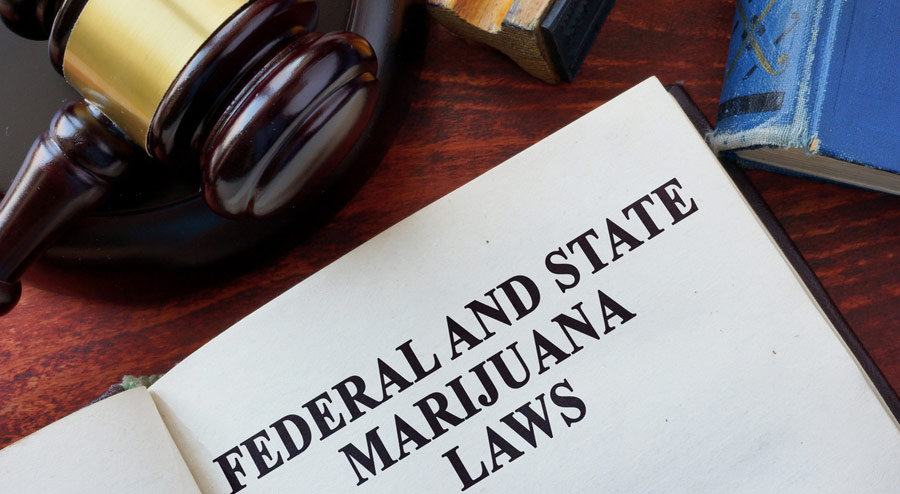As with the cannabis industry, cannabis laws are changing quickly across the country. With some states approving the use of medical marijuana and other legislating and regulating recreational cannabis, it might seem that things are finally progressing. Federally, however, marijuana is still considered a schedule 1 drug and there’s no clear indication that federal laws will change any time soon.
Cannabis laws are complicated. Federal law doesn’t agree with state law in a lot of cases and between recreational marijuana, medicinal marijuana, and decriminalization, the rules, and consequences vary drastically from state to state. In order to get a better idea of how the law applies to your state, it helps to understand the fundamentals of the law.
What Does Marijuana Legalization Actually Mean?
Legalized marijuana doesn’t mean that anyone can walk into any shop and buy pot. In fact, legalizing cannabis actually put a lot of regulations into place. There are still plenty of laws surrounding marijuana use. They’re just much different than they used to be.
Some states, including Colorado and Washington, have started legalizing recreational marijuana use by adults age 21 and older and granting licenses to retail shops thereby turning the marijuana industry into a legitimate business.
In a state where marijuana is legal, you cannot be fined, arrested, convicted, or serve jail time for possession or using it as long as you follow state law. That is, you’re of age with a legal amount product in a place where use is permitted. Since it’s also licensed and taxed in these states, you can still get arrested for selling it if you’re not doing it properly.
In other words, if you’re older than 21, go to the local cannabis shop, and buy a small amount of marijuana or recreational weed for use in your own home, that’s perfectly legal, even if you are caught in possession. On the other hand, if you’re 18 and buy black market marijuana from your dealer, that is not.
What about Medical Marijuana?
Medical marijuana was first legalized in California in 1996 and is now the law of the land in many states. These laws typically strictly limit the number of ounces you can have at any one time or how many plants can be grown. Some states even have laws determining the number of day’s supply a patient can have.
Patients have to qualify for medical marijuana and have their physician’s approval. Then, they can use it within the limits of the law without having to worry about being arrested, fined, or prosecuted.
The legalization of medical marijuana has also had a huge impact on growers in these states. Obviously, patients who need medical marijuana have to get it from somewhere so laws were put into place to make it legal to grow and sell to medical depositories.
Is Marijuana Legalization the Same as Decriminalization?

No, and this is where things tend to get a little more confusing. Decriminalization means that, while marijuana is still illegal, the crimes are no longer result in prosecution. Basically, that means that small amounts of marijuana meant for personal use won’t result in arrest, fine, or a criminal record. That said, it’s growing and selling large quantities of marijuana is still a punishable offense with significant consequences.
What about Federal Law?
At the federal level, marijuana use is still considered illegal and it’s classified as a controlled substance. This means that there is significant conflict between federal laws and state laws legalizing cannabis.
This makes things a little more difficult for those states. If the growing and retail businesses are kept completely in-state, there’s a better chance that it will be seen to be operating legally. There are some complications for these businesses due to the disagreement in the law. They can’t bank normally since banks are federally regulated and under federal law, their money is being made from selling an illegal substance. That’s not all. Since these businesses are illegal according to the federal government, business owners dealing in marijuana are not able to deduct business expenses from their federal taxes.
Will Federal Law Change?
Time will tell but it’s not as simple as you might think. One big hurdle is the federal government’s drug classification system.
Federal law classified drugs as schedule 1, 2, 3, 4, or 5. Schedule 1 drugs are seen as having no medicinal value and a high potential for dependency and abuse whereas schedule 5 drugs are seen to have a low potential for abuse and reasonable medicinal value.
For example, cough medicine with less than 200 mg of codeine per 100 ml is considered a schedule 5 drug. It’s medicinally effective with a low potential for abuse.
Marijuana is considered a schedule 1 drug, along with heroin, LSD, and ecstasy. Again, these drugs are seen as having no accepted medical value and a high potential for abuse. Schedule 2 drugs include methadone, oxycodone, morphine, and fentanyl. These drugs are also seen as having a high potential for addiction or abuse but are accepted to have some medicinal value.
Because marijuana is currently classified as a schedule 1 drug, it’s unlikely to be legalized unless its classification changes. Although there has been a lot of push to reschedule marijuana, one major hurdle standing in the way is that there haven’t been any large-scale studies done that conclusively prove its medicinal value and, because it’s so strictly regulated, it’s actually very difficult to conduct such a study.
The Future of Cannabis Legalization
It’s uncertain what the future of federal cannabis laws will hold. Penalties for marijuana crimes are generally less harsh than for other schedule 1 drugs, which can be seen as a nod to the idea that it’s not as much of a risk as other schedule 1 drugs like heroin or ecstasy.
Until federal legislation changes to keep up with evolving opinions of cannabis, the rift between state and federal law will continue. If you live in a state where recreational marijuana is legal or if you’re involved in growing or selling it, make sure you know the law for your state and how it affects your business.
